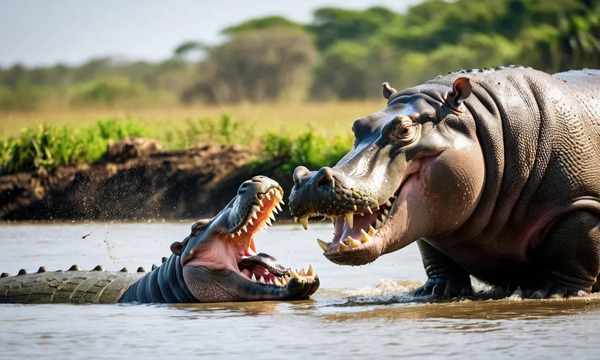Introduction: Why Compare Crocodiles and Hippos?
Physical Characteristics: Size, Weight, and Appearance
Table: Crocodile vs Hippo Physical Comparison
Strength Comparison
Bite Force
Speed on Land and in Water
Behavior and Aggression
Territorial Nature
Hunting vs. Defense
Interactions in the Wild
Conflict Scenarios: When Do They Clash?
Do Crocodiles Attack Hippos?
Survival Strategies
Hippo Defense Mechanisms
Crocodile Hunting Techniques
Crocodile vs. Hippo: Who Would Win in a Fight?
Broader Ecosystem Impact: Their Role in African Rivers
FAQs about Hippos and Crocodiles

Crocodiles and hippos are two of the most iconic animals found in African rivers. Both are incredibly powerful and often share the same habitats, leading to inevitable conflicts. While crocodiles are apex predators, hippos are known for their territorial aggression and incredible size. This article dives into their strengths, weaknesses, and their interactions in the wild.
Let’s start with their basic physical stats. Crocodiles are sleek, armored reptiles designed for stealth and surprise attacks. Hippos, on the other hand, are massive mammals with tough, nearly impenetrable skin.
Table: Crocodile vs Hippo Physical Comparison
| Feature | Crocodile | Hippopotamus |
|---|---|---|
| Average Weight | 500-1,500 pounds | 3,000-4,000 pounds |
| Length | 12-20 feet | 10-15 feet |
| Skin | Thick, scaly armor | Tough, smooth skin |
| Lifespan | 70-100 years | 40-50 years |
| Teeth | Sharp, conical (80 teeth) | Large, tusk-like canines |
Crocodiles have one of the strongest bite forces in the animal kingdom, clocking in at 3,700 pounds per square inch (PSI). Hippos, surprisingly, are even stronger, with a bite force of 1,800 PSI but backed by their enormous size and tusks that can crush a crocodile’s body.
On Land: Hippos can surprisingly run up to 19-25 mph, while crocodiles top out at around 11 mph.
In Water: Crocodiles are faster swimmers at 20-25 mph compared to the hippo’s 5 mph.
Hippos are notoriously territorial, especially in water. They’re known to aggressively defend their space and will charge at anything that enters their territory, including crocodiles. Crocodiles, while aggressive hunters, tend to avoid unnecessary conflicts with adult hippos.
Crocodiles are stealth predators, relying on ambush tactics to catch prey. Hippos, on the other hand, are herbivores but use their size and strength purely for defense.
Crocodiles often target hippo calves, leading to clashes with adult hippos. Adult hippos are rarely preyed upon due to their size, but droughts and scarce resources can increase aggression between the two species.
Yes, but usually only in desperation or if they see an opportunity with a weak or young hippo.
Their size and strength are their biggest assets.
Hippos travel in pods, offering safety in numbers.
Thick skin protects them from bites and scratches.
Stealth and ambush: Crocodiles lie in wait, camouflaged in water.
They rely on their powerful jaws to drag prey underwater and drown it.
If a full-grown crocodile and a full-grown hippo were to fight, the hippo would almost always win due to its size, strength, and tough skin. Crocodiles can deliver a devastating bite, but they are no match for the hippo’s sheer power and aggression.
Crocodiles are crucial for controlling fish populations, maintaining the balance of aquatic ecosystems.
Hippos shape river environments by grazing on vegetation and creating paths through wetlands, which benefits other species.
Q: Do crocodiles eat hippos?
A: Crocodiles usually don’t eat adult hippos but may target calves.
Q: Are hippos more dangerous than crocodiles?
A: Statistically, yes. Hippos are responsible for more human deaths in Africa than crocodiles.
Q: Can crocodiles and hippos coexist?
A: Yes, they often share habitats, but hippos dominate when it comes to disputes.
This detailed comparison highlights the strengths, behaviors, and interactions of crocodiles and hippos, providing insights into their fascinating dynamics in the wild.
We created this article in conjunction with AI technology, then made sure it was fact-checked and edited by a Animals Top editor.